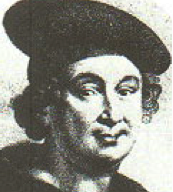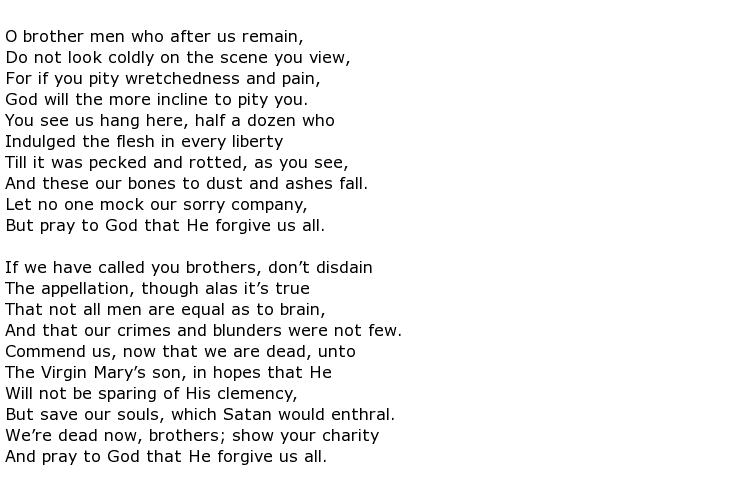 François Villon was a most colourful character in 15th century France. In literary terms he is generally believed to be the best known French poet of his time but, from a personal perspective, he was a villain who seemed to be constantly at odds with the law and never far from the hangman’s noose. He was, in fact, sentenced to death in 1463 but it was commuted to banishment, and he simply disappeared without trace thereafter. His adventures certainly gave him plenty of material about which to write when he found the time to compose his poems.
François Villon was a most colourful character in 15th century France. In literary terms he is generally believed to be the best known French poet of his time but, from a personal perspective, he was a villain who seemed to be constantly at odds with the law and never far from the hangman’s noose. He was, in fact, sentenced to death in 1463 but it was commuted to banishment, and he simply disappeared without trace thereafter. His adventures certainly gave him plenty of material about which to write when he found the time to compose his poems.
It is believed that he was born in either 1431 or 1432 into a turbulent Paris which was engaged, at that time, in such activities as the burning at the stake of the famous Joan of Arc. There is speculation about the poet’s birth name. It may have been François des Loges or François de Montcorbier. Much depends on WHERE he was actually born of course, this being a clue to his real name. What is certain, however, is that he used the name Villon for his work.
There were at least two known collections of poetry attributed to him, the most famous being Le Testament. This is sometimes referred to as Le Grand Testament. There is likely to be some biographical information within these bodies of work. It is suggested here that “Villon” was born into a poor family and he later took his step-father’s name. Despite a difficult childhood, the boy had some literary talent and he achieved a Bachelor’s degree in 1449 from the University of Paris, and then went back to complete his master’s three years later.
Unfortunately he was in trouble soon after. During June 1455 he was involved in a street brawl which resulted in the death of a priest. Villon was named as the assailant but he had already fled from justice although he did, in fact, receive a royal pardon. The following year he was again involved in a crime, this time theft of gold crowns from the chapel of the Collège de Navarre. Once again Villon fled the scene but he was cited as the ringleader of a gang of thieves responsible. He stayed away from Paris for some time and it is alleged that he was involved in regular criminal activity as a part of a wandering gang of thieves.
Villon found the time to write though and it is thought that he spent time during the summer of 1461 composing Le Testament. This was, most certainly, a significant piece of work and one of great seriousness and gravitas. Conversely he is attributed with writing a number of much shorter pieces, some of which are almost a celebration of the lowly life of the common thief of which, according to legend, he was one. A good example of this genre was a poem called The Ballad of the Hanged Men although some literary scholars have suggested that this was written by someone else pretending to be Villon. If, indeed, he did write it then it suggests that the men that he was writing about were suffering the kind of grisly fate that would probably befall him in time. Here are the opening verses of the poem:

One thing that is certain though is that Villon’s influence on poets, playwrights and musical composers for centuries afterwards was considerable with many writers claiming to have been inspired by the man and his work. The great uncertainty is what became of François Villon after January 1463 when it is believed that he fled from Paris for the last time. One man responsible for translating some of his work, Anthony Bonner, said the following of the enigmatic poet:

If he did die around this time that would have put him in his early thirties on death.

